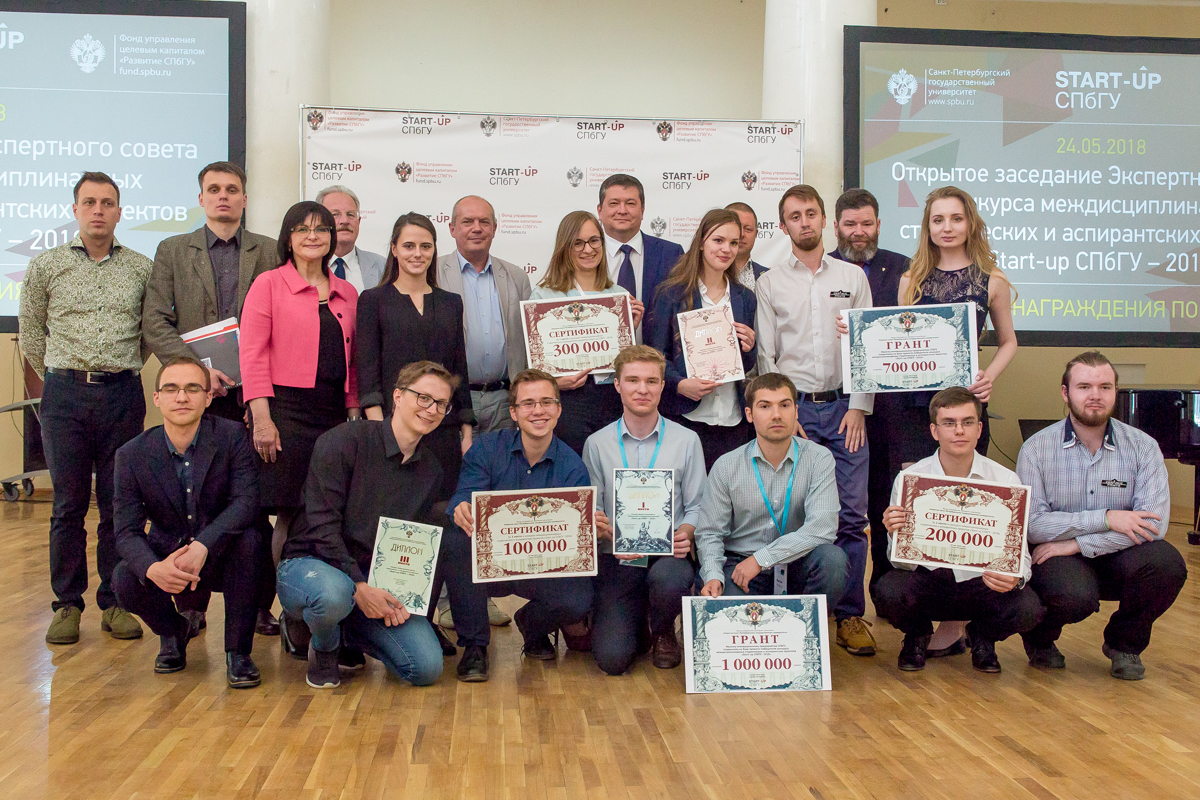The creators of a patch for checking blood sugar levels get 1.3 million rubles at the SPbU Start-Up competition

The Start-Up – 2018 competition held at SPbU resulted in the Diaplast student team becoming the winner. They were awarded a 300,000 ruble scholarship and a 1 mln ruble grant for their express system for checking blood sugar levels that no longer requires finger pricks. Thanks to it, the patients no longer have to pierce the skin to do the analysis. It is a patch that tests blood glucose in sweat.
"You should take the test on an empty stomach," said the author of the idea, a student in Medicine Anna Malkova. "You wake up in the morning, stick the patch, and do what you want. Meanwhile, it causes sweat to accumulate under the patch and in 10-15 minutes it measures the glucose level. You’d better avoid doing vigorous activities as physically-demanding exercises actively burn glucose".
The team is headed by Maksim Kuznetsov, a student in Medicine, and also includes Viktor Alekseev, a student in Economics, and student in Law Maria Evsukova. They have already developed the technology and are now selecting the materials for the future patch. The innovation is based on aptamers that are oligonucleotide molecules that bind to a specific target molecule. The system is designed to work as the pregnancy test does – it will have two lines: the first one is a control line that tells whether the system properly works and the second line is an indicator line which appears when the glucose level is higher than 6 mmol/L.
The second place, a scholarship of 200,000 rubles and a grant of 700,000 rubles were awarded to the Ceramicprints team. The students presented a 3D dental crown printer. Today, the young scientists are developing a new generation material that is photopolymer resins, or liquid ceramics for 3D printing of the dental crowns that will be potentially cheaper than their analogues.
The winners will receive the two main grants (1,000,000 rubles and 700,000 rubles) only after they create SPbU-based small innovative enterprises (SIE) for implementation of their developments.
The third place and a scholarship of 100,000 rubles were awarded to the D.E.N.T. team, who offered to equip dental clinics with electronic extractors, which will enable the dentists to extract the fragments of broken files from the canals by contact cold welding. They are intuitive to use so you don’t have to gain additional qualification.
The main requirements of the competition are to create a team of three or five SPbU students of three different fields of study, and to come up with a science-intensive and commercially promising project. The winners of each stage are selected by an expert council, which includes SPbU representatives and well-known entrepreneurs.
"You all work in a necessary and very interesting area," said Sergey Aplonov, SPbU Vice Rector for Research. "Transferring the achievements of fundamental science into the industry and business is one of the main objectives facing the Russian science. It is very positive that, being so young, you are trying to implement your results and are not afraid to take risks. This excitement in your eyes is an important, though not the only, condition for successful work in science, business and any other field."
Prizes in the amount of 100,000 rubles were also awarded to the scientific supervisors of the winning teams: Professor and Doctor of Medical Sciences Natalia Sokolovich who is also Head of the Department of Dentistry at SPbU, and Doctor of Chemistry and SPbU Associate Professor Alina Manshina.
About a third of the projects submitted for the competition were related to medicine, so it is no surprise that all the three winners' start-ups were also based on medical technology.
"Such a bias is understandable," said Evgeny Pen, Chairman of the Expert Council, Executive Director of the "SPbU Development" Endowment Management Fund. "On the one hand, medicine as a business area will always be funded, since modern people do not spare money for their health, and the students are right in striving to implement their ideas in this field. On the other hand, it is the University as a largest interdisciplinary venue that makes it possible to quickly "assemble" teams by selecting representatives of different branches — physicists, chemists, mathematicians, lawyers, and managers. And the medical field which is actively developing at SPbU helped them to find supporters among the medical staff — both students who became members of the teams and teachers who became the scientific supervisors of the projects."
The "SPbU Start-Up" competition is supported by the SPbU Endowment Management Fund for the third time. This year the organising committee received 36 applications. Only 11 teams made it to the second round. All participants of these teams were being awarded a scholarship from the Fund (10,000 rubles each) for three months, to improve their ideas.
"The university has a huge creative potential: it is here that breakthrough ideas are born and innovative products are created," Evgeny Pen said. "The main goal of the competition is to show young scientists that science can be monetised. You do not have to store the results of intellectual property in the archives, you should actively manage them. All the teams that have submitted their projects combine the scientific and technical knowledge with management and marketing. Only such a synthesis of competencies allows us to unlock the commercial potential of inventions and ensures commercialisation of intellectual property."
By the way, this year the University will start accepting students' start-up projects as diploma projects. For that, the start-uppers, however, have to win one of the top places in the SPbU competition or in other similar competitions.

